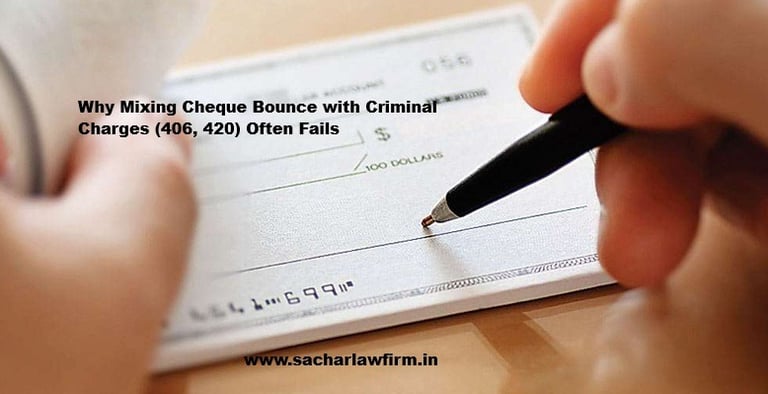AdVocate harshit Sachar | chamber no: 617 | district courts ludhiana | 2817 gurdev nagar ludhiana | ✆+91 7889228369
Why Mixing Cheque Bounce with Criminal Charges (406, 420) Often Fails – And How Time-Barred Civil Remedies Hurt Businesses
Many businessmen rush to file criminal cases along with cheque bounce matters, but end up losing both civil and criminal remedies due to delay. Here’s why this happens and how to avoid it.
Advocate Harshit Sachar, Ludhiana Mob +91 7888228369
8/23/20252 min read


Introduction
In India, when business payments get stuck and even cheques bounce, parties often rush to the police station to file criminal complaints under Section 420 IPC (cheating) and Section 406 IPC (criminal breach of trust) along with Section 138 NI Act (cheque bounce).
But many such cases drag on for years, only to end with courts holding that the matter is civil in nature, not criminal. By the time this realization comes, the three-year limitation period for filing a proper civil recovery suit may already be over—leaving the aggrieved party with no effective remedy.
Why Criminal Charges (406, 420) Fail in Business Transactions
Section 406 IPC (Criminal Breach of Trust):
To prove this, prosecution must show that the accused had entrusted property and then dishonestly misused it. In pure business dealings, where money is advanced as payment or loan, courts usually hold it as a contractual dispute, not breach of trust.Section 420 IPC (Cheating):
Cheating requires proof that the accused had a fraudulent intention from the beginning. Merely failing to pay or defaulting in business transactions is not cheating—it is breach of contract.
Courts have repeatedly quashed such FIRs, stating that they are attempts to convert civil disputes into criminal cases.Section 138 NI Act (Cheque Bounce):
While cheque bounce is punishable, it is a quasi-criminal remedy limited to cheque dishonour. It does not recover the entire business amount or other pending dues.
The Real Danger: Losing Civil Remedy
Most parties waste years pursuing criminal cases. By the time they realise that the matter is actually civil, 3 years from the date of default or last acknowledgement have already passed.
This makes their civil suit for recovery time-barred under the Limitation Act, 1963.
Result:
Cheque bounce cases may end in only fine/penalty, not actual recovery.
Criminal complaints under 406/420 fail.
Civil recovery suit cannot be filed due to limitation.
👉 The claimant loses both time and money.
What Should Be Done Instead?
File a Civil Recovery Suit in Time
Always file a civil suit for recovery of money within 3 years of cause of action. Even if criminal remedies are pursued, don’t neglect the civil side.Use Cheque Bounce Proceedings as Support
Cheque bounce complaints under Section 138 NI Act can run parallel, but should not be the only remedy.Avoid Misuse of Criminal Provisions
Instead of forcing Sections 406/420 IPC in every business matter, focus on strong civil recovery through decree and execution.Consult an Advocate Early
Proper legal advice at the beginning saves both money and time. An advocate can ensure that civil suits, cheque bounce cases, and criminal remedies (if genuinely applicable) are pursued together strategically.
Conclusion
Misusing criminal provisions in business disputes often backfires. Courts are strict in distinguishing civil breach of contract from criminal offences. By the time businessmen realise this, their civil claim is time-barred, and nothing can be recovered.
👉 The lesson is clear: Act in time, choose the right remedy, and don’t rely solely on criminal charges for business recovery.
Get the assistance of a perfect advocate who can help you in identifying the correct remedies—whether civil suits, cheque bounce cases, or genuine criminal complaints—so that your rights are protected before it’s too late.
Services
Sachar Law Firm – Advocate, Lawyer, Attorney & Solicitor Services in India | Ludhiana, Punjab.
Expert legal advice across various practice areas - Civil, Criminal, Divorce and Matrimonial, Consumer and Corporate laws, Bail Matters, Property Contract Disputes, Insurance claim disputes, cyber Crime cases, Cheque bounce, Family Divisions, Arbitration. Bail Matters, Electricity Board Cases, Appeals before Session court Ludhiana, Marriage certificate, Court Marriage, Succession Certificate Accident Claim (MACT), NRI Legal Matters, NRI Property Matters.
“Get in Touch with Sachar Law Firm”
Quick Links
© 2025. All rights reserved.
Advocate Harshit SACHAR
Legal Blog
2817, 1st Floor , Gurdev Nagar, Ludhiana, Punjab -141001
Address: Office Cum Res:
Corporate Liquidation and Recovery Litigation
☎️ 0161 7965410
